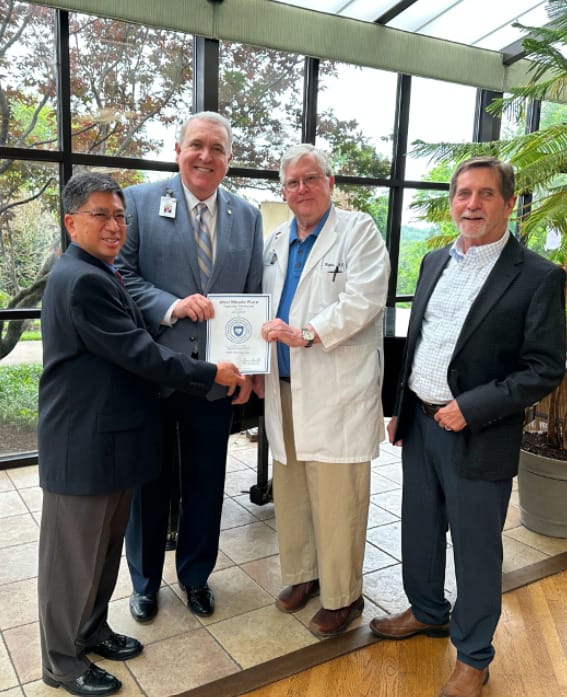
Mechanical ventilation is the most common intervention for patients admitted to ICUs to allow them to breathe sufficiently on their own. However, prolonged mechanical ventilation can lead to a host of negative outcomes for patients.
In the U.S., there are very few quality requirements for mechanical ventilation in long-term care facilities.
Over the past twenty years, Gene Gantt, RRT, FAARC, developed best practices for safely and successfully weaning patients in Tennessee off long-term mechanical ventilation. His successes have been standardized as a widely-recognized accreditation available through the Physician-Patient Alliance for Health & Safety (PPAHS), a non-profit (501(c)(3)) advocating for patient health and safety priorities.
Consequences of prolonged mechanical ventilation
The need for mechanical ventilation may occur as a result of a range of breathing and respiratory illnesses, from acute asthma to lung cancer.
During COVID, there was a surge in patients requiring mechanical ventilation. More than one million patients who are admitted to ICUs in the U.S. receive mechanical ventilation each year. Nearly 10% of all critically ill patients and up to 34% of those ventilated for more than two days require extended periods of ventilatory support.
Currently, over 100,000 patients per year require prolonged mechanical ventilation (PMV), which usually lasts over three weeks. PMV cases are increasing from year to year.
PMV, especially in alternate care settings where most patients are elderly, is a patient safety issue. Researchers have found that care of patients receiving prolonged mechanical ventilation is expensive and their overall outcomes are often poor. Delaying weaning from mechanical ventilation increases morbidity and patients are at increased risk of pneumonia, barotrauma, tracheal injuries and musculoskeletal deconditioning, according to Mario Fadila, MD, and his University of Missouri colleagues.
Until very recently, there have been no standardized protocols for safely weaning patients off of long-term mechanical ventilation. New accreditation is now available from PPAHS.
The PPAHS Accreditation in Enhanced Respiratory Care builds on the program developed by Gene Gantt. Based on standards published by the American Association for Respiratory Care (AARC), Gantt’s program was awarded a national recognition of excellence by the American College of Chest Physicians. Gantt was also the former chair of the long-term care section and is the AARC representative to the Respiratory Compromise Institute.

Gantt originally established Tennessee’s very first long-term ventilator program in a state-regulated nursing home in 2001 as a means of preparing families for ventilator care at home. The motivation for the project was the idea that a better job could be done preparing caregivers if it was done at a slower pace than traditionally done in a busy hospital ICU.
At that time, respiratory therapists were the hands-on providers of respiratory care and as clinicians, Gantt wanted to make facilities as safe and clinically sound as possible. Although there were no standard requirements at the time, Gantt opted to staff the unit 24 hours a day with respiratory therapists and to provide redundant monitoring in case of ventilator failure or accidental disconnect.
Gantt found that the majority of patients could be weaned. In the first year, he liberated 65% of patients.
Realizing this model’s effectiveness, Gantt developed the initial TennCare standards which were adopted by the Tennessee Board of Respiratory Care as an official position statement. AARC formally adopted the Tennessee position statement as a position statement in 2007 and the standards were codified as a Medicaid requirement in Tennessee in 2014. AARC endorses and supports the Program by PPAHS.
The most important thing to know to wean a patient off of mechanical ventilation
The best practice depends on the patient. Long-term ventilation weaning is made more difficult due to patient stress and often deep depression. One of the very first steps Gantt recommends is to humanize the patient so that they feel more optimistic.
For example, the placement of a speaking valve so they can communicate does wonders for successful weaning. Not only does it allow them to speak but it’s also beneficial in alveolar/lung recruitment resulting in more stable oxygen saturation. All of the patients in long-term care have failed standard protocols so RTs must be creative in their methods.
No current national standards of care
There are no national standards from the Centers for Medicare & Medicaid Services or any other governing bodies that provide target standards for long-term ventilator care. The successful outcomes achieved from following the standards in Tennessee stimulated the idea of national accreditation of facilities that met or exceeded the standards.
For the first time, there is a national standard of care. Building on the program that Gantt developed in Tennessee, PPAHS is providing Enhanced Respiratory Care in two parts: certification of the clinician and then accreditation of facilities.
Certification entails clinicians taking continuing medical education courses on Enhanced Respiratory Care. These courses educate clinicians through online and hands-on learning in:
- Culture of a weaning program
- Resident selection
- Quality of life
- Weaning approaches
- Ventilator unit technology/equipment
- Discharge processes
- Process improvement
There are few training courses that are specific to long-term care. RTs who specialize in this arena rely on manufacturers and clinical experience to learn the ropes. The PPAHS offers specialized programs targeted toward long-term care.
Accreditation is recognition that a facility meets or exceeds the national standard of care. These standards create a safe environment for those receiving care in non-acute facilities and provide families with the assurance that the facilities are operating at a high clinical level and that loved ones are being cared for according to a recognized standard of care.
More information on Enhanced Respiratory Care certification and accreditation can be obtained at https://ppahs.org/enhanced-respiratory-care/.
Nathaniel Miller, PhD, is a freelance writer based in Denver. He is a recovering academic who previously held a visiting professorship and research fellowships at the University of Cambridge and New York University Abu Dhabi. His writing has appeared in The New York Times, The Marginalia Review, Reading Religion, and elsewhere.
The opinions expressed in McKnight’s Long-Term Care News guest submissions are the author’s and are not necessarily those of McKnight’s Long-Term Care News or its editors.
Have a column idea? See our submission guidelines here.





